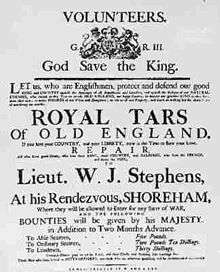Jack Tar
For the 1915 British silent film, see Jack Tar (film).
Jack Tar (also Jacktar, Jack-tar or Tar) was a common English term originally used to refer to seamen of the Merchant or Royal Navy, particularly during the period of the British Empire. By World War I the term was used as a nickname for those in the U.S. Navy.[1] Both members of the public, and seafarers themselves, made use of the name in identifying those who went to sea. It was not used as a pejorative and sailors were happy to use the term to label themselves.[2]
Etymology

Recruitment poster from the Napoleonic Wars
There are several plausible etymologies for the reference to 'tar'.
- In the age of wooden sailing vessels, a ship's rigging was rope made of hemp, which would rot quickly in such a damp environment. To avoid this, the ropes and cables of the standing rig were soaked in tar, which had to be replenished by tarring.[3]
- Seamen were known to 'tar' their clothes before departing on voyages, in order to make them waterproof, before the invention of waterproof fabrics. Later they frequently wore coats and hats made from a waterproof fabric called tarpaulin. This may have been shortened to 'tar' at some point.
- It was common amongst seamen to plat their long hair into a ponytail and smear it with high grade tar to prevent it getting caught in the ship's equipment.
Use
- Gilbert and Sullivan's operetta, H.M.S. Pinafore, subtitled The Lass That Loved a Sailor, uses the synonym 'tar' frequently in its dialogue, including the songs 'The Merry Maiden and the Tar' and 'A British Tar'.
- One of John Philip Sousa's lesser known works was his 'Jack Tar March', written in 1903, which featured "The Sailor's Hornpipe" tune in one of its segments.
- Jack Tar: Life in Nelson’s Navy, best-selling non-fiction book written by Roy and Lesley Adkins about the real lives of sailors in Nelson's age.[4]
- The traditional English folk song "Go to Sea Once More" (alternately titled "Jack Tarr the Sailor") tells the tale of a sailor by the name of Jack Tarr who loses everything after an ill-advised drunken escapade while ashore in Liverpool.
- The traditional English folk song "Jacky Tar", sung by Eliza Carthy (previously collected and sung by A. L. Lloyd as "Do Me Ama"): Roud 511; Laws K40; Ballad Index LK40.[5]
- John Adams called the crowd involved with the Boston Massacre "a motley rabble of saucy boys, negros and molattoes, Irish teagues and outlandish jack tarrs".[6]
- "Heart of Oak", the official march of the Royal Navy, features the line "Heart of oak are our ships, jolly tars are our men".
- Rollins College of Winter Park, Florida chose the "Tar" as its mascot.[7]
- People born in Swansea, UK are known as "Jacks" or "Swansea Jacks". One explanation for the name is that the people of Swansea had a reputation as skilled sailors and that their services were much sought after by the navy.[8]
- In Anthony Shaffer's comedy/thriller play Sleuth, the most prominent of Andrew Wyke's automata is Jolly Jack Tarr, the Jovial Sailor. This life-sized figure laughs, and his body shakes appropriately, with the pressing of a remote control button. He is in several scenes, including one where a clue to a murder is hidden on Jolly Jack Tarr's person.
References
- ↑
- ↑ Williams, James H (1917). "A Better Berth for Jack Tar". The Independent. New York: S.W. Benedict (Sept. 29): 502–503, 515. Retrieved Mar 24, 2010.
- ↑ Bruzelius, Lars (1998). "Fordyce: Blacking Rigging, 1837". Blacking Rigging. The Maritime History Virtual Archives. Retrieved April 19, 2010.
- ↑
- ↑ http://mainlynorfolk.info/lloyd/songs/domeama.html
- ↑ http://www.loc.gov/exhibits/treasures/trr046.html The Murder of Crispus Attucks
- ↑ http://www.rollinssports.com/ViewArticle.dbml?DB_OEM_ID=19500&ATCLID=1549188
- ↑ http://www.kgbanswers.co.uk/why-are-swansea-city-football-fans-known-as-jacks-or-jack-army/2372962
External links
| Look up jacktar in Wiktionary, the free dictionary. |
- Williams, James H (1917). "A Better Berth for Jack Tar". The Independent. New York: S.W. Benedict. 91 (Sept. 29): 502–503, 515. Retrieved Mar 24, 2010.—Article by an Able Seaman describing the Seamen's Act of 1915 and conditions for seafarers
 "Jack Tar". New International Encyclopedia. 1905.
"Jack Tar". New International Encyclopedia. 1905.
This article is issued from Wikipedia - version of the 11/2/2016. The text is available under the Creative Commons Attribution/Share Alike but additional terms may apply for the media files.